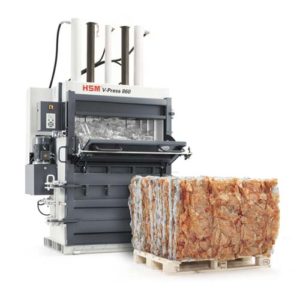How to bale & tie cardboard with a baler (Video & Instructions)
How to properly use a vertical or horizontal baling machine?
Updated on Oct. 13, 2021 | Authors: Pim Brouwer & Brent Nijssen
How do you bale and tie a cardboard bale? For baling OCC, boxes, and other (corrugated) cardboard waste into a dense bale, you need a vertical baler or horizontal cardboard baling machine. How do you operate these machines and how does the baling process work for each type of baler? We’ve selected the best instructional demonstration videos on using cardboard balers for your inspiration.
![]()
Do you want to know more about cardboard baler machines?
How to videos on cardboard balers:
Watch informative YouTube videos on vertical and horizontal balers.
- How to bale cardboard with a vertical baler?
- How to bale cardboard with a horizontal closed-end baler?
- How to bale cardboard with a horizontal open-end single-ram baler?
- How to bale cardboard with a horizontal open-end two ram baler?
How to bale cardboard with a vertical baler?
A vertical baler is a compact recycling machine that compresses cardboard waste into a single bale with a vertical ram. These manual baling machines are meant for low-volume baling of cardboard waste. Learn more about vertical balers.
Also, read our tips about what type of cardboard can be placed in a vertical baler?
How to bale cardboard with a horizontal closed-end baler?
A horizontal closed-end baler is a semi-automatic baler for baling large quantities of cardboard waste. These closed-door balers produce 4-5 bales of OCC per hour that are tied manually by the operator. Learn more about horizontal closed-end balers.
How to bale cardboard with a horizontal open-end single-ram baler?
A horizontal baler with open-end is an auto-tie baler, which means it is full automatic. The base variant is a single-ram baler that contains one horizontal cylinder to compact the waste materials into a dense bale. Open-end balers are capable of processing large volumes of waste. Learn more about open-end balers.
How to bale cardboard with a horizontal open-end two ram baler?
A horizontal open-end baler with two rams is the most powerful type of baling machine. This twin ram variant has two rams for compressing cardboard and other bulky waste materials into dense and compact bales. Learn more about open-end balers.
How does the baling process work?
- Prepare the machine with baler strapping wire.
- Fill the baling machine with cardboard waste material.
- Close off the door and start compressing.
- Open the door and wrap the bales with wiring to keep them together.
- Place a pallet and eject the cardboard bale onto the pallet.

Cycle time and hourly bale output
The time it takes to compress cardboard waste into a bale depends on the type of baling machine and the operator’s experience because it takes time to prepare and load the machine with cardboard. The compactor presses the cardboard with a hydraulic press. However, after compressing the cardboard, the operator needs to strap the cardboard bale and eject it onto a pallet.
Ultimately, the specifications or user manual of a cardboard baler will tell you the average cycle time, as well as the hourly output. What is the difference, and what does it mean?
What is the cycle time?
The cycle time indicates the average time it takes for the baler to perform one cycle. This cycle is measured with a unloaded baler, so when there are no waste materials inside the chamber.
On average one cycle takes up 30 seconds, depending on the type of vertical baler. But this doesn’t mean that you can make a cardboard bale in 30 seconds. The time it takes to produce one bale of cardboard is measured in the hourly output of the baler.
![]()
How long does it take to bale one bale of cardboard with a vertical baler?
How long does it take to bale one bale of cardboard with a vertical baler? The production time of compacting cardboard packaging waste to a bale takes up multiple cycles. The average time to produce one bale depends on the type of material, the availability of waste materials at the site, and the operator’s efficiency.
Sometimes you can find in the manufacturer’s guide manual specifications you can find the baler’s hourly bale output.
The output tells you how many bales the compactor produces per hour. Small-sized cardboard balers can produce 3-5 smaller bales per hour, and larger-sized baling machines can produce 1-3 large bales per hour.
But keep in mind that these numbers are averages, and your company’s real output can differ.
Customer references
What type of businesses use a cardboard baler and what type of baling machine did they choose? Balers are used in many industries, such as recycling, print, retail, workshops, logistics, and hotels. A vertical or horizontal cardboard baler suits any business that wants to reduce the volume of their waste streams and produce dense bales out of it.
Read inspiring and helpful customer experiences on the reference pages from Bramidan and HSM.
Which baler is right for you?
Choosing the right baler for your needs asks for expert advice. And we are here to help you find the best baler for your company. You can read more about vertical cardboard balers or find more information about horizontal balers.
 Find the right baler for your business
Find the right baler for your business
Advice and pricing for cardboard balers
We believe that good advice is essential. Every month we help hundreds of businesses worldwide find the right vertical baler.
- Recycle waste and reduce cost on waste collection
- Our global network of experts are ready to help
- Trusted brands that offer great service and maintenance
Check cardboard balers
Get free advice from our experts
By Recycling.com/ 22 August 2022